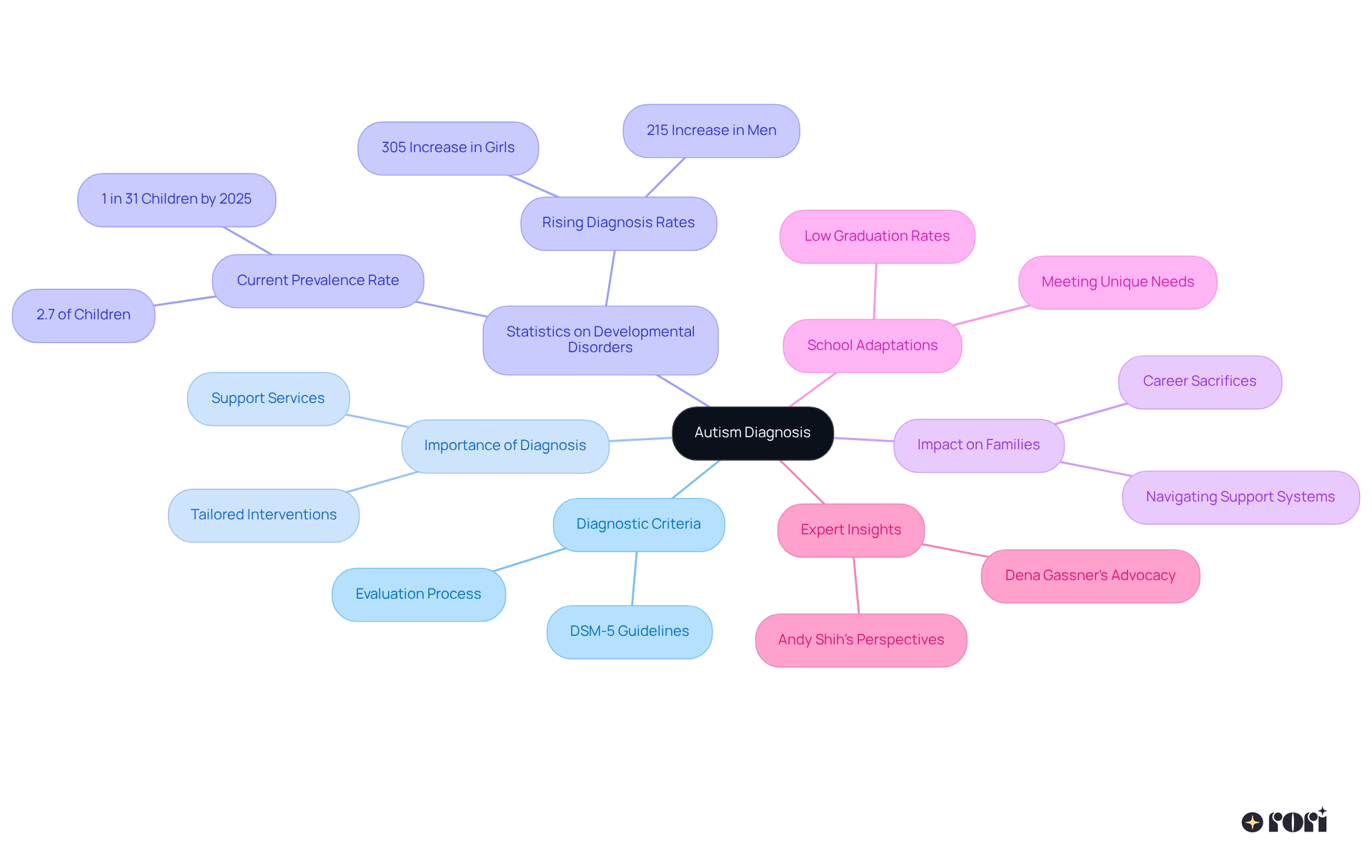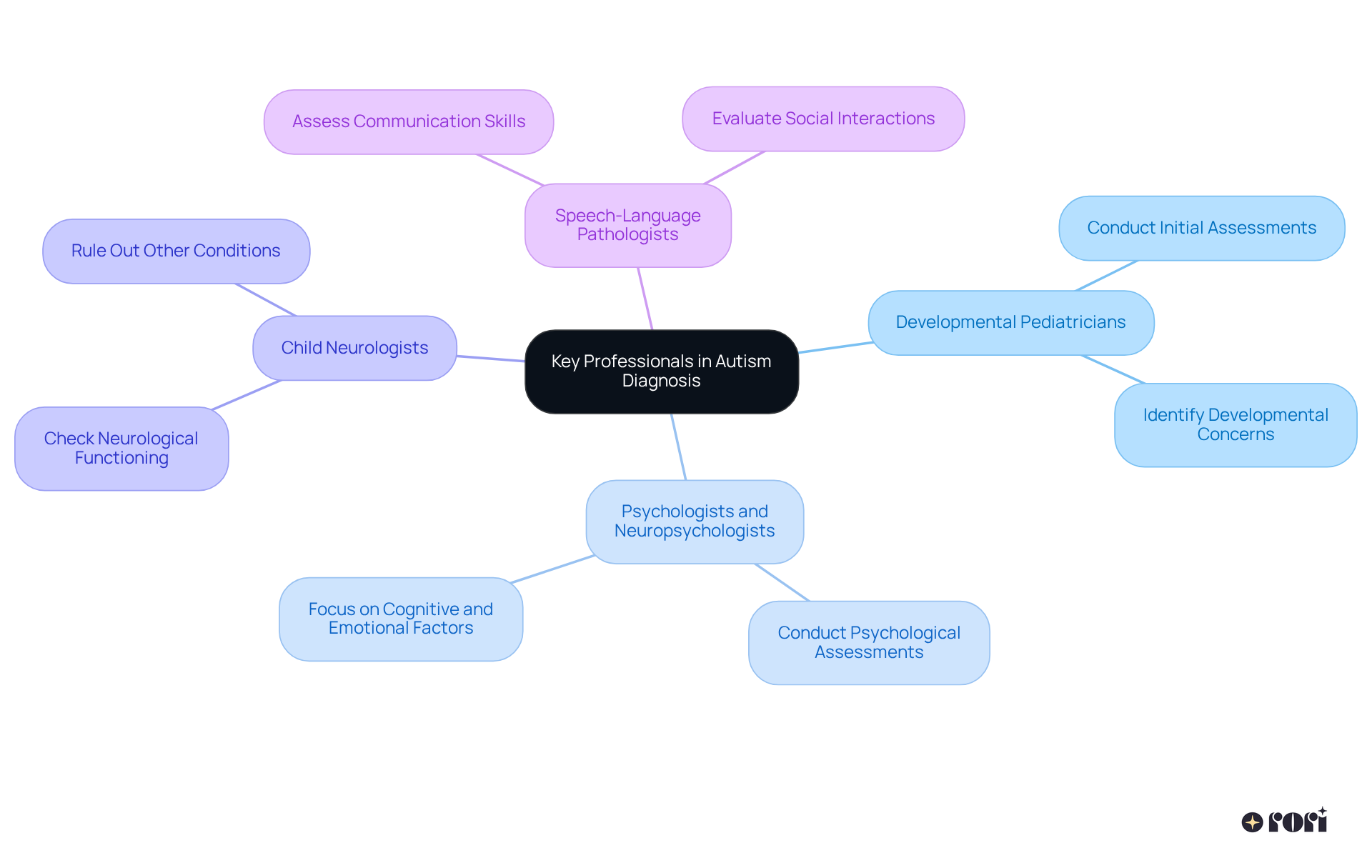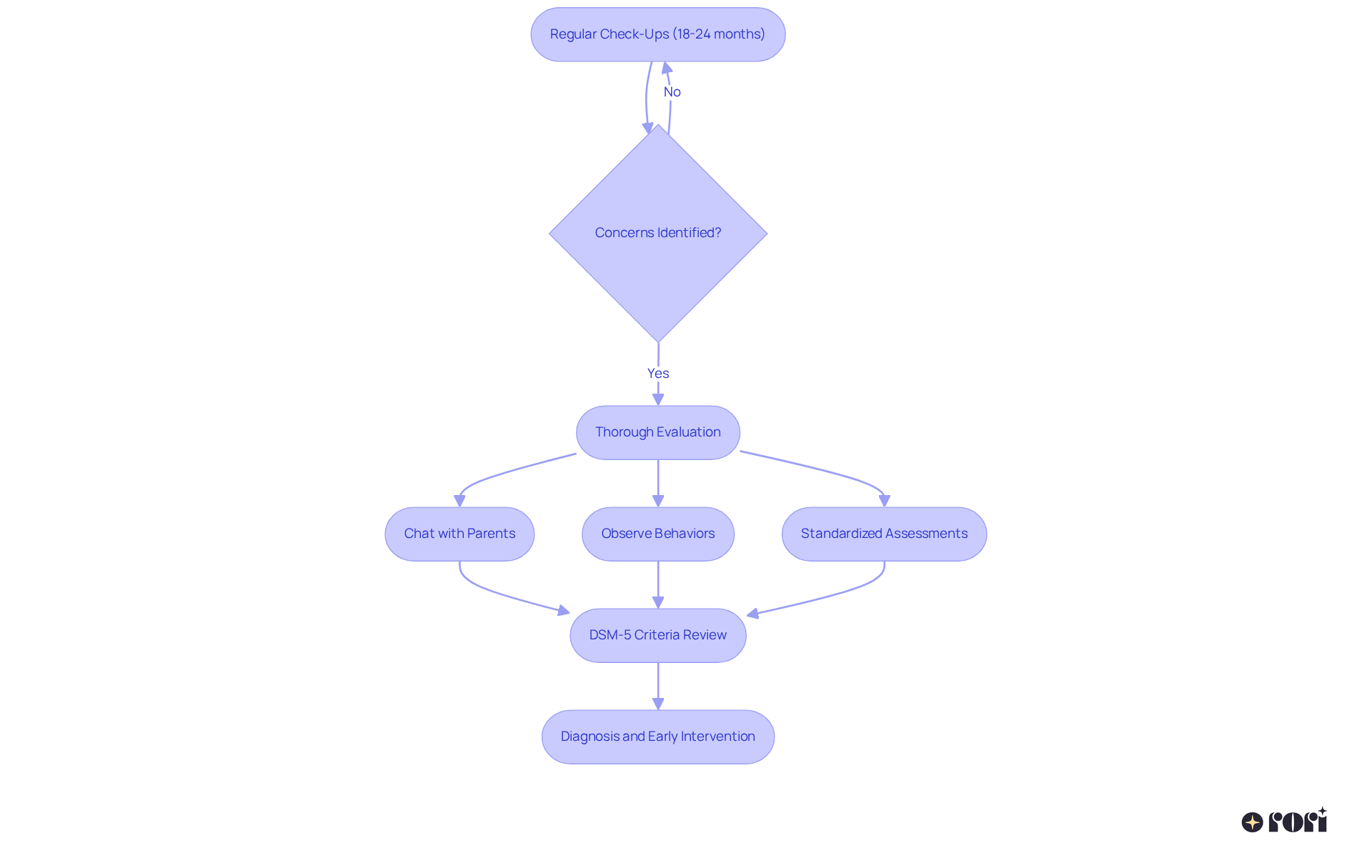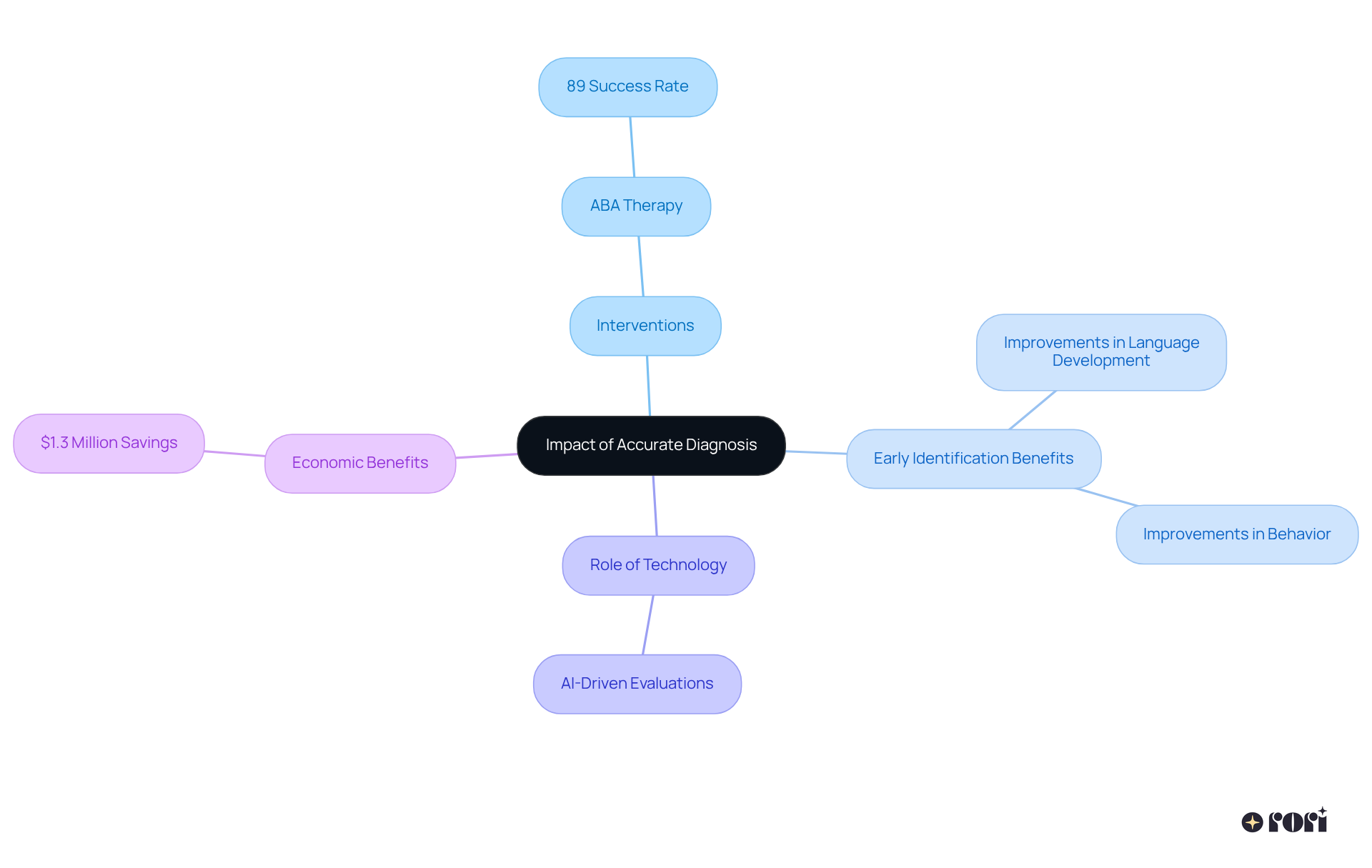When it comes to diagnosing autism, a team of specialists plays a crucial role. Developmental pediatricians, psychologists, child neurologists, and speech-language pathologists each bring their unique expertise to the table. This collaborative effort is what makes the evaluation process so thorough and effective.
It's important to understand that this multidisciplinary approach isn’t just a nice-to-have; it’s essential for getting an accurate diagnosis. Tailored interventions that arise from this comprehensive evaluation can significantly enhance developmental outcomes for children with Autism Spectrum Disorder (ASD). So, let’s explore this together and see how these professionals work hand in hand to support our children!
Understanding the complexities of autism diagnosis is more important than ever. With developmental disorders affecting an increasing number of children—now estimated at 1 in 31—it's crucial to navigate this journey together. This article explores the essential roles that specialists play in diagnosing Autism Spectrum Disorder (ASD) and highlights the significant implications of accurate assessments.
However, many families still face overwhelming challenges in this process. It can feel daunting, but you’re not alone! What can be done to ensure that every child receives the timely and precise evaluation they deserve? Let’s explore this together!
Identifying autism is about understanding what specialist diagnoses autism by evaluating if someone meets the criteria for Autism Spectrum Disorder (ASD) as defined in the Diagnostic and Statistical Manual of Mental Disorders (DSM-5). This process is crucial because it opens the door to tailored interventions and support services that can really boost a young person's development. Did you know that the current rate of developmental disorders in the U.S. is 2.7% among children? Even more concerning is that, as of April 15, 2025, it’s now 1 in 31 children! This really underscores the urgent need for effective diagnostic practices, especially in understanding what specialist diagnoses autism.
But the impact of a precise assessment goes beyond just the individual. It touches families, schools, and healthcare providers, highlighting the need for a caring and thorough approach to evaluation. Many parents, often mothers, find themselves giving up their careers to become full-time caregivers, navigating a maze of support systems that can be quite overwhelming. Plus, schools need to adapt their methods to meet the unique needs of autistic students, as many struggle with low graduation rates.
Understanding the nuances of developmental disorder assessments is vital for parents and caregivers. It lays the groundwork for effective treatment and support strategies. Unfortunately, systemic issues often lead to insufficient assistance for many autistic individuals and their families, making timely and accurate evaluations even more important.
Bringing in insights from experts like Andy Shih and Dena Gassner can really enrich this conversation, offering valuable perspectives on the importance of identifying autism. Let’s explore this together! We’re here to help you every step of the way!

When it comes to what specialist diagnoses autism spectrum disorder (ASD), it’s often a team effort! A group of professionals, each with their own expertise, comes together to make sure every aspect is covered. Typically, what specialist diagnoses autism are:
This collaborative approach not only enhances the accuracy of the diagnosis but also clarifies what specialist diagnoses autism, helping to create a tailored treatment plan that fits each child's unique needs.
Did you know that having a well-coordinated multidisciplinary team can really boost diagnostic outcomes? It ensures that every aspect of a child’s development is taken into account. So, if you’re a parent navigating this journey, remember, you’re not alone! Let’s explore this together and ensure your child gets the support they need!

The journey of diagnosing developmental disorders often starts during regular check-ups, especially around 18 and 24 months. If there are any concerns, a more thorough evaluation is needed. This can involve chatting with parents, observing behaviors, and using standardized assessments. The American Psychiatric Association's DSM-5 criteria are essential in this process, focusing on ongoing challenges in social communication and specific interests.
Did you know that about 67.3% of youth with developmental disorders are identified through special education eligibility? This highlights just how important it is to catch these signs early. Statistics show that nearly half of children with autism are evaluated by age 3, which underscores the critical need for early assessment and intervention.
As families, it’s important to be prepared for a journey that may involve several appointments, as the average age for identification is around 47 months. Early intervention is key; a timely diagnosis can make a world of difference, allowing for effective treatment strategies to be put in place. Research indicates that children diagnosed sooner are more likely to benefit from tailored interventions, so being proactive in the diagnostic process is crucial.
Various professionals, like developmental pediatricians and clinical psychologists, are crucial in assessing what specialist diagnoses autism. They’re here to support you every step of the way! Let’s explore this together and ensure your child gets the best possible start.

A precise diagnosis of developmental disorder by what specialist diagnoses autism is crucial for identifying the best interventions and support services for young individuals. It opens the door for families to access specialized therapies, like Applied Behavior Analysis (ABA), which research shows has an impressive success rate of over 89% in boosting social skills, communication, and independence among individuals with autism. Isn’t that wonderful?
Studies reveal that when individuals are identified early, they often show greater improvements in behavior and social interactions compared to those identified later. For instance, early intervention can lead to significant gains in language development and adaptive behaviors, with benefits lasting for years after the intervention. Plus, a precise diagnosis helps families understand their child's unique needs, creating a nurturing environment that fosters growth and development.
And let’s not forget the role of technology! With AI-driven evaluations, the diagnostic process becomes even more tailored and effective. This means not only is the evaluation process simplified, but interventions can be customized to enhance outcomes, ultimately improving the quality of life for individuals with autism and their families, which helps clarify what specialist diagnoses autism.
Moreover, early intervention can save an estimated $1.3 million per child over their lifetime by reducing long-term care needs. This highlights the economic benefits of timely diagnosis and support. So, let’s explore this together! We’re here to help you every step of the way!

Understanding the complexities of autism diagnosis is essential for ensuring that individuals receive the appropriate support and interventions they need. This article highlights the critical roles played by various specialists in diagnosing Autism Spectrum Disorder (ASD), emphasizing how important collaboration is in this process. An accurate diagnosis not only identifies the unique needs of each child but also opens the door to tailored therapies that can significantly enhance their development and quality of life.
Key insights from our discussion reveal just how important early identification and intervention can be. These steps can lead to substantial improvements in communication, social skills, and overall behavior. When a multidisciplinary team—including developmental pediatricians, psychologists, and speech-language pathologists—comes together, they ensure that all aspects of a child's development are thoroughly evaluated. This comprehensive approach is vital for creating effective treatment plans that address the specific challenges faced by autistic individuals.
Ultimately, the significance of a timely and accurate autism diagnosis cannot be overstated. It serves as a foundation for families to access essential resources and support services, fostering an environment where children can truly thrive. As awareness of autism continues to grow, it’s crucial for parents and caregivers to advocate for early assessments and seek out the necessary professional support. By doing so, they can help pave the way for a brighter future for their children, filled with opportunities for growth and success. Let’s explore this journey together—because we’re here to help you every step of the way!
What is the process for diagnosing autism?
The process involves evaluating whether an individual meets the criteria for Autism Spectrum Disorder (ASD) as defined in the Diagnostic and Statistical Manual of Mental Disorders (DSM-5).
Why is autism diagnosis important?
A precise autism diagnosis is crucial because it enables access to tailored interventions and support services that can significantly enhance a young person's development.
What is the current rate of developmental disorders among children in the U.S.?
The current rate of developmental disorders in the U.S. is 2.7% among children, with a concerning statistic of 1 in 31 children diagnosed as of April 15, 2025.
How does autism diagnosis impact families and schools?
Accurate assessments affect families by necessitating adjustments in caregiving roles and can influence schools to adapt their methods to meet the unique needs of autistic students, who often face low graduation rates.
What challenges do parents face when seeking autism diagnosis and support?
Many parents, particularly mothers, may have to give up their careers to become full-time caregivers, navigating complex support systems that can be overwhelming.
Why is understanding developmental disorder assessments vital for caregivers?
Understanding these assessments is essential for parents and caregivers as it lays the groundwork for effective treatment and support strategies for autistic individuals.
What systemic issues affect support for autistic individuals and their families?
Systemic issues often lead to insufficient assistance for many autistic individuals and their families, making timely and accurate evaluations even more critical.
Who are some experts that provide insights into autism diagnosis?
Experts like Andy Shih and Dena Gassner offer valuable perspectives on the importance of identifying autism, enriching the conversation around diagnosis and support.